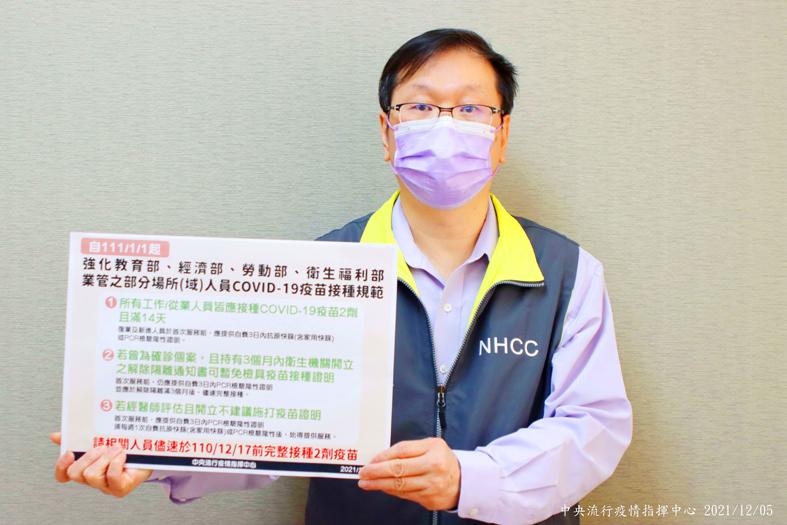People working in sectors supervised by the education, economics, labor, and health and welfare ministries must be fully vaccinated by next month, the Central Epidemic Command Center (CECC) said yesterday.
“Starting from Jan. 1, vaccination rules for workers at industries supervised by the Ministry of Education, the Ministry of Economic Affairs, the Ministry of Labor, and the Ministry of Health and Welfare will be further enhanced,” said Centers for Disease Control Deputy Director-General Chuang Jen-hsiang (莊人祥), who is the CECC’s spokesman.
New employees and those returning to work must provide a negative COVID-19 test result — an antigen rapid test, at-home rapid test or polymerase chain reaction (PCR) test — taken three days before the first day of work, he said.

Photo courtesy of Centers for Disease Control
People who have recovered from COVID-19 and have a “Notice for Release From Isolation Treatment” issued by a local health department within the past three months would not need to provide a vaccination record, Chuang said.
However, they would still need to provide a negative PCR test result taken within three days of starting work and receive a COVID-19 vaccine as soon as possible, he added.
People with a COVID-19 vaccine exemption certificate issued by a doctor must provide a negative PCR test result obtained within three days of starting work, and also take an antigen rapid test, at-home rapid test or PCR test every week, Chuang said.
“As the policy takes effect in January, we urge the workers to receive their second dose before December 17,” he said.
Establishments supervised by the education ministry include: preschools and schools up to the senior-high school level, afterschool childcare centers, community colleges, cram schools, senior citizens’ learning centers, competitive and recreational sports facilities, swimming pools and performing arts rehearsal venues.
Businesses overseen by the economics ministry include: video recording and broadcasting venues, electronic game arcades, Internet cafes, karaoke halls, KTVs, tabletop gaming centers, mahjong clubs, discos, hostess bars, nightclubs, pubs, video stores, hostess teahouses, saunas, wedding or banquet halls, beauty salons, convention halls and exhibition venues.
Vocational training facilities are the only establishments overseen by the labor ministry that would be affected by the policy.
Establishments supervised by the health ministry are infant care centers, community care facilities, dementia community service stations, parent-child centers, childcare resource centers and folk therapy businesses.
The policy also covers community healthcare and welfare events.
The CECC said it has set up a vaccination station at Taipei Main Station where Moderna Inc’s COVID-19 vaccine would be offered to eligible recipients through Thursday.
The vaccination station, in the west corridor of Taipei Main Station’s main hall, is open from 1pm to 8pm, Chuang said, adding that the service is open to Taiwanese and foreigners.
Eligibility covers people 18 or older, those who have received a first dose of the Moderna vaccine at least four weeks earlier, and people who received a first dose of the AstraZeneca vaccine at least eight weeks earlier, he said.
People who are vaccinated at the station would receive a NT$100 voucher that they can use at Pxmart Co (全聯福利中心) supermarket outlets, the CECC said.
The CECC yesterday also reported four imported cases of COVID-19: travelers from Indonesia, Laos, Vietnam and the US.

Taiwan is gearing up to celebrate the New Year at events across the country, headlined by the annual countdown and Taipei 101 fireworks display at midnight. Many of the events are to be livesteamed online. See below for lineups and links: Taipei Taipei’s New Year’s Party 2026 is to begin at 7pm and run until 1am, with the theme “Sailing to the Future.” South Korean girl group KARA is headlining the concert at Taipei City Hall Plaza, with additional performances by Amber An (安心亞), Nick Chou (周湯豪), hip-hop trio Nine One One (玖壹壹), Bii (畢書盡), girl group Genblue (幻藍小熊) and more. The festivities are to

Auckland rang in 2026 with a downtown fireworks display launched from New Zealand’s tallest structure, Sky Tower, making it the first major city to greet the new year at a celebration dampened by rain, while crowds in Taipei braved the elements to watch Taipei 101’s display. South Pacific countries are the first to bid farewell to 2025. Clocks struck midnight in Auckland, with a population of 1.7 million, 18 hours before the famous ball was to drop in New York’s Times Square. The five-minute display involved 3,500 fireworks launched from the 240m Sky Tower. Smaller community events were canceled across New Zealand’s

The Ministry of Foreign Affairs (MOFA) yesterday said it is closely monitoring developments in Venezuela, and would continue to cooperate with democratic allies and work together for regional and global security, stability, and prosperity. The remarks came after the US on Saturday launched a series of airstrikes in Venezuela and kidnapped Venezuelan President Nicolas Maduro, who was later flown to New York along with his wife. The pair face US charges related to drug trafficking and alleged cooperation with gangs designated as terrorist organizations. Maduro has denied the allegations. The ministry said that it is closely monitoring the political and economic situation

‘SLICING METHOD’: In the event of a blockade, the China Coast Guard would intercept Taiwanese ships while its navy would seek to deter foreign intervention China’s military drills around Taiwan this week signaled potential strategies to cut the nation off from energy supplies and foreign military assistance, a US think tank report said. The Chinese People’s Liberation Army (PLA) conducted what it called “Justice Mission 2025” exercises from Monday to Tuesday in five maritime zones and airspace around Taiwan, calling them a warning to “Taiwanese independence” forces. In a report released on Wednesday, the Institute for the Study of War said the exercises effectively simulated blocking shipping routes to major port cities, including Kaohsiung, Keelung and Hualien. Taiwan would be highly vulnerable under such a blockade, because it